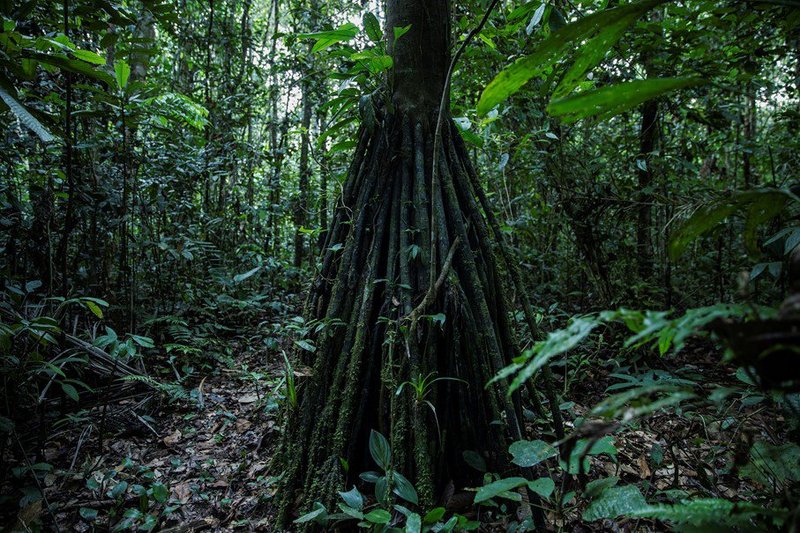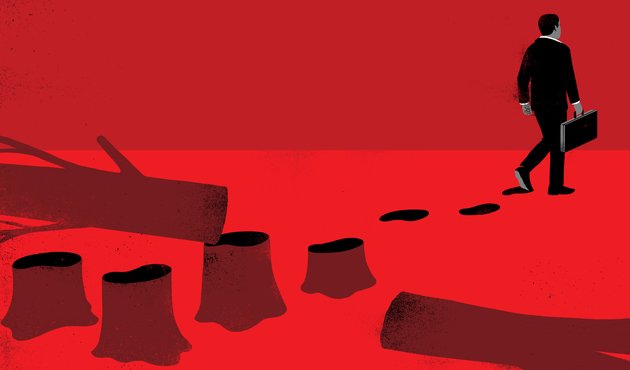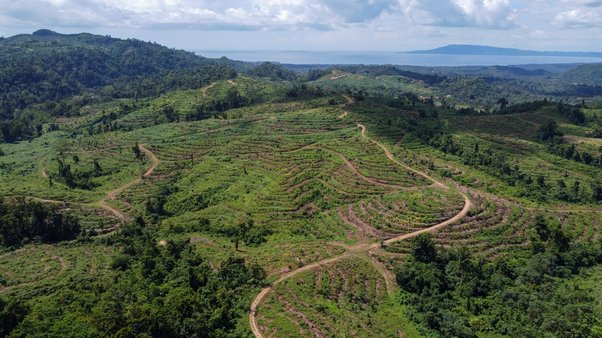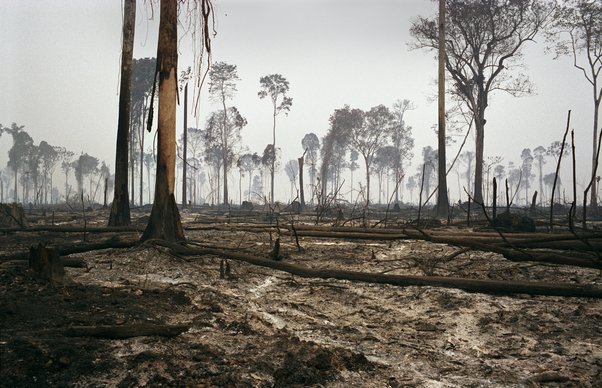China is one of the world's largest consumers of agricultural commodities such as soy and palm oil that drive deforestation globally. But it isn’t just Chinese consumption of these commodities that is helping fuel forest destruction. Our new analysis sheds a spotlight on the often-overlooked role of Chinese banks as some of the biggest global financiers of deforestation.
From January 2013 to April 2020, Chinese banks and investors provided over $22.5 billion USD to major companies producing and trading commodities – pulp and paper, rubber, timber, palm oil, soy and beef – at high risk of driving deforestation.
There are clear warning signs that Chinese financiers currently have inadequate safeguarding in place to address risks associated with deforestation.
The production of commodities such as palm oil, soy and beef is widely documented to drive deforestation in the world's climate critical tropical forests, which are often also the planet's most biodiverse areas, and home to indigenous people.
Forests are also home to more than 80% may risk the spread of further zoonotic diseases – such as Covid 19 – that pass from animals to humans.
Promises made by companies around the world to eliminate deforestation from their supply chains by 2020 have proved meaningless as many failed to deliver on the pledges.
China itself has made bold commitments to become carbon neutral by 2060 and is hosting a UN biodiversity summit in 2021.
To make these commitments effective, China’s banking regulator needs to ensure Chinese banks do not continue financing agribusinesses that exacerbate the climate crisis and biodiversity loss.
Recommendations
- The Chinese banking regulator needs to ensure that banks are taking account of the environmental and social impact of the companies they finance. This can be achieved by revising regulations such as the China’s law on commercial banks, to require the banking sector not to finance companies linked to deforestation, or other types of environmental destruction and social damage.
- Chinese banks should commit to ending their support for companies involved in deforestation and undertake rigorous checks on the companies which are operating in sectors or regions where there is a high risk of deforestation to ensure they are not associated with deforestation.
So how significant is Chinese financing globally?
The total financing provided by Chinese financial institutions places China as the sixth largest financier in the world for major companies producing and trading forest-risk commodities.
Our analysis is based on public data produced by Forest and Finance, an initiative by a coalition of campaign and research organisations.
According to the data, Chinese banks and investors provided over 22.5bn USD loans and underwriting from January 2013 to April 2020 to major companies producing and trading forest-risk commodities.
The data also shows that, overall, financial institutions based in Brazil, Malaysia, the US and Indonesia, countries which are all major producers of such commodities, provided the largest amount of financing.
However, if we exclude financiers based in producer countries, China ranks the second largest financier worldwide, just after Japan.
The role of major Chinese commercial banks
China is in a unique position to reduce its finance sector’s global deforestation footprint quickly and effectively, as just a handful of Chinese banks provided a significant share of the financing for major companies producing and trading forest-risk commodities.
The data shows that 67% of the Chinese financing was provided by Chinese companies that primarily operate as commercial banks.
Although it has been widely reported that commodities such as palm oil, soy and beef drive deforestation and biodiversity loss globally, these Chinese banks appear unconcerned as they provided billions to support the companies involved in the production and trade of such commodities.
Just five of the biggest Chinese commercial banks[1] provided 10.25bn USD over more than seven years from 2013, which accounts for 45% of all the financing provided by Chinese financial institutions.
These banks dominate China's retail banking landscape and have become some of the world's largest banks in recent years.
The Industrial and Commercial Bank of China and Bank of China are the biggest financiers. Each respectively provided 3.66bn USD and 2.91bn USD of financing for major companies producing and trading forest-risk commodities between January 2013 to April 2020.
The Industrial and Commercial Bank of China and Bank of China are also among the worst performing banks worldwide in a ranking created by Forest 500 which assesses the deforestation policies of the 500 most influential companies and financial institutions in forest-risk commodity supply chains.
In the 2020 assessment, they both scored 0 out of 100, the lowest possible score for any bank assessed against indicators in four categories.
Our closer examination below of the companies that received billions from the Chinese banks for producing and trading palm oil, soy and beef, further demonstrates that Chinese banks have done little or no due diligence to ensure their money is not fuelling environmental and social damage.
We chose to focus on the palm oil, soy and beef sectors because these three commodities have led to the most forest being replaced from 2001 to 2015 according to the World Resources Institute, an organization that monitors global tree cover loss.
A recent report by Forest and Finance, finds that about 29% of the analysed Chinese financing provided from 2016 to 2020 went to companies producing and trading these three commodities, and 64% went to supply chains of rubber, pulp and paper.
Warning signs in the palm oil sector
From January 2013 to April 2020, Chinese banks funnelled $3.2 billion USD worth of loans and underwriting services into the palm oil sector, the analysis suggests. This is a sector that after decades of exposure and scrutiny is still often associated with environmental and social harm.
Palm oil continues to drive extensive deforestation, not only in traditional major producing countries, like Indonesia and Malaysia, but also in new frontiers like Papua New Guinea and West African countries including Cameroon.
In this period, the Forest and Finance data show Chinese banks provided $2.1 billion USD to a single company for its palm oil operations – COFCO (which stands for China Oil and Foodstuffs Corporation), China's largest agricultural processing and trading company.
As COFCO doesn't produce its own palm oil, the only way of ensuring this oil is not associated with deforestation or human rights abuses would be to monitor its suppliers and to exclude those which present environmental and social risks.
COFCO International, the group’s international trading arm, requires suppliers to avoid deforestation in its supplier code of conduct. It appears however that COFCO may not be putting this policy into practice.
Our analysis reveals that 77 processing facilities which had been suspended by palm oil giant Unilever for non-compliance with its sourcing policies[2] were still listed as COFCO suppliers in 2019.
This is based on the latest disclosures from Unilever (September 2020) and COFCO (in 2019).
It is concerning that COFCO has failed to exclude suppliers that have been in breach of Unilever’s sourcing policy dating back as far as 2010, and therefore could be guilty of deforestation.
Chinese banks are also supporting other major Chinese companies including ZTE and Tianjin Julong, which have been linked to palm oil concessions in Indonesia.
As of January 2021, neither company had adopted a no-deforestation policy, according to tracking initiatives.
A report by financial analyst Chain Reaction Research earlier this year found that Tianjin Julong's supply chains have been linked to deforestation, forest fires and community rights breaches since 2010.
The company’s membership of the Roundtable on Sustainable Palm Oil was terminated in 2016 due to reporting failures.

Another major company financed by Chinese banks is Wilmar, the world's largest palm oil trader. Since 2007, the investigative group Greenpeace has released a series of reports exposing Wilmar’s role in forest destruction.
In 2018, Greenpeace alleged that Wilmar was still linked to forest destruction in Indonesia almost five years after committing to end deforestation in its supply chains.
In 2019, Greenpeace stopped engaging with the company’s joint deforestation-monitoring platform, due to concerns about Wilmar’s failure to follow through on its environmental promises.
Chinese banks have also provided 31.8mn USD of financing to two US agribusiness giants ADM and Bunge for their palm oil operations, according to the Forests and Finance analysis.
In 2020, Global Witness revealed that ADM and Bunge sourced from Indonesian palm oil mills that had been accused of violating local community land rights, including seizing community-owned land, attacking community members, and causing serious environmental degradation.
The Forest and Finance database listed 28 palm oil groups that received financing from Chinese banks. Nine of these firms are among a list compiled by Greenpeace of the palm oil groups most closely linked to the 2019 Indonesian forest fire crisis, with the highest number of fire hotspots in their own concessions or in concessions linked to them.
Some of the Indonesian fires were reportedly started in order to clear land for plantations, a practice common in tropical forests around the world.
The fire and ensuing haze had a profoundly damaging impact on public health and the climate. Greenpeace estimates that land around 40 times the size of Hong Kong burned between 2015 and 2019 in Indonesia.
How is Chinese financing linked to deforestation in Brazil?
The rate of deforestation in Brazil has surged to its highest level in over a decade. A leading Brazilian scientist has warned that the Amazon rainforest could disappear unless immediate action is taken to reverse deforestation.
Deforestation in Brazil is largely driven by the production of soya beans and beef.
The loss of the precious Amazon ecosystem in Brazil has regional and global implications for us and for the planet's health.
Chinese banks should be concerned too. For one, deforestation has an impact on regional water cycles and climate. Any degradation in growing conditions in Brazil could therefore threaten China's food security, as it is by far the biggest consumer of Brazilian soy and beef.
The environmental group Mighty Earth has published a tracker of ten major soy traders and meatpackers using satellite imagery of deforestation and land clearance.
It ranked the companies based on the extent, severity, and response to the clearance in their Brazilian supply chains.
According to the latest monitoring data, the five companies[3] that received the most financing from Chinese banks for soy and beef operations in Brazil were all found by Mighty Earth to be exposed to deforestation and land clearance.
Combined together, these five companies were found to be linked to 161,018 hectares of forest clearance since October 2017.
COFCO, the company that received the vast majority of the financing from the Chinese banks in the Brazilian soy and beef sectors, ranked the sixth worst deforester out of ten in Mighty Earth’s latest analysis.
As mentioned above, COFCO’s international arm requires suppliers to avoid deforestation.
However, Mighty Earth's latest tracker recorded 21,498 hectares of forest clearance by suppliers linked to COFCO since October 2017, most of which it described as “possibly illegal” due to the likelihood that it had taken place in reserves and preservation areas.

The world's climate critical tropical forests are often also the planet's most biodiverse areas and home to Indigenous people. Lalo de Almeida / Panos / Global Witness
JBS, the biggest meat producer in the world, received funds from China Construction Bank, despite the company’s poor environmental track record and a number of published exposés on its links to environmental and biodiversity destruction in the Brazilian Amazon.
Global Witness recently revealed how between 2017 and 2019, JBS bought cattle from at least 327 ranches in the Amazon in which deforestation occurred.
Other institutions have also raised red flags about JBS. For example, analysts at the global banking giant HSBC criticised JBS’s environmental record, citing concerns about deforestation in its beef supply chains.
The investment fund of Norges Bank, Norway’s central bank and Nordea Asset Management, the investment arm of northern Europe’s largest financial services group, have both dropped JBS from their portfolios, respectively citing concerns about the risk of JBS being responsible for corruption and JBS’s link to deforestation.
What should Chinese banks do about deforestation risks?
Unless Chinese financiers undertake more rigorous checks on the companies they fund which are engaged in high-risk sectors often associated with deforestation, they could be fuelling global forest destruction and contributing to biodiversity loss and climate change.
So, what should the banks do?
Chinese banks should commit to ending their support for companies involved in deforestation and undertake rigorous checks on the companies which are operating in sectors or regions where there is a high risk of deforestation to ensure they are not associated with deforestation.
What role can the banking regulator play?
China is well-placed to achieve deforestation-free financing quickly, as a large portion of its financing of forest-risk commodities is provided by a small number of Chinese banks.
The Chinese banking regulator needs to ensure that banks are taking account of the environmental impact of the companies they finance, including via regulations to require the sector to check their clients' environmental and social credentials and the impacts and risks of their operations and supply chains.
The regulator must also explicitly require banks to refrain from financing deforestation.
A proposed revision of the Chinese law for commercial banks provides a crucial opportunity to act on this agenda.
Global Witness would like to see the revised law explicitly require the banking sector not to finance companies linked to deforestation, or other types of environmental destruction and social damage.
These requirements could be transformative in achieving China's green ambitions.
The law should build on requirements set out in several guidelines issued by the Chinese government in recent years.
For example, the Green Credit Guidelines (2012) require financial institutions to carry out due diligence, including for environmental and social risks; and the 2017 Guidance from a national banking regulator sets out further requirements for Chinese banks to “strengthen environmental and social risk management” when exposed to risks outside China.
Banks can be a force for change and will be crucial to supporting the transformation needed for China to achieve its 2060 carbon neutrality goal.
The question is if and how quickly China will introduce mandatory requirements to steer its banking sector away from financing deforestation.
Such action could deliver real results in China's quest to curb biodiversity loss and significantly contribute to the global fight to halt the climate crisis.
Under the spotlight: Chinese banks' risky agribusiness portfolio
Download Resource[1] These are the biggest five banks by assets, including the Industrial and Commercial Bank of China, Bank of China, Bank of Communications, Agricultural Bank of China and China Construction Bank Ltd.
[2] Unilever and COFCO’ policies differ as Unilever’s bans all deforestation activity while COFCO International’s merely states that deforestation should be avoided.
[3] The five companies are COFCO, Cargill, Bunge, ADM, LDC. The Brazil Agriculture Finance Program was excluded as it is a programme that subsidises multiple companies. Please refer to Forest and Finance’s explanation on the programme.
Company responses
We wrote to some of the companies named in the report but didn’t get a response.
This document compiles previous responses made by companies named in the report.
Read this page in



